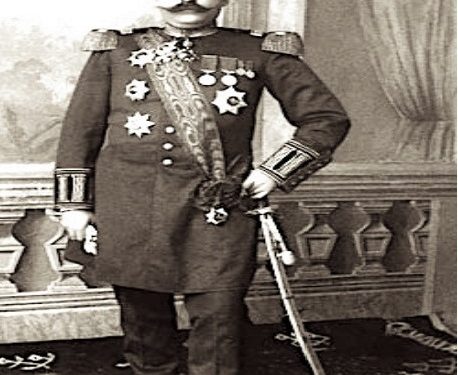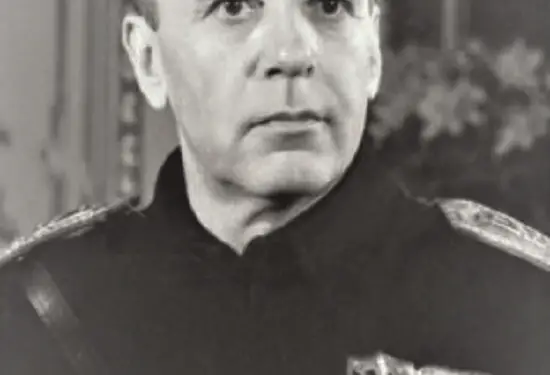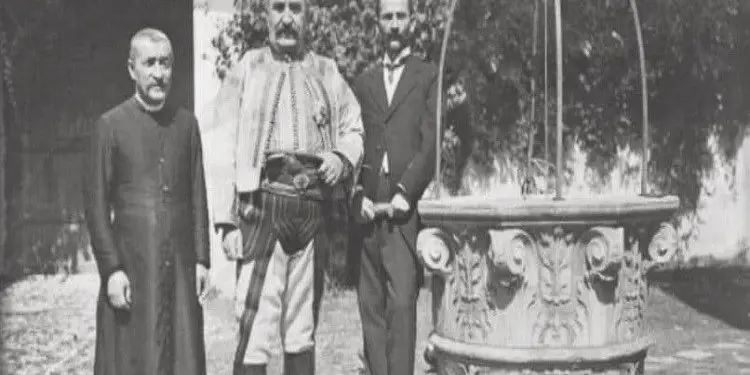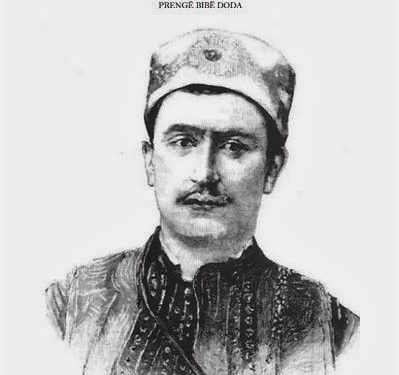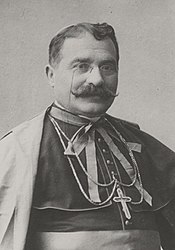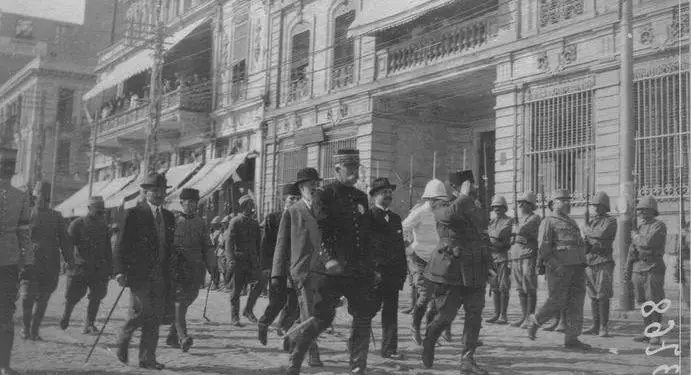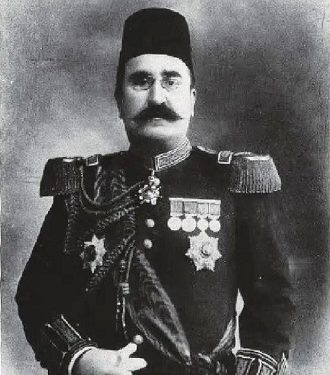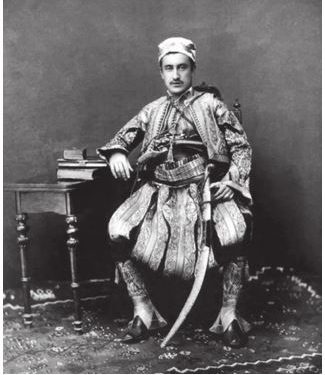By Dr. Nikol Loka
Part nineteen
“PRENGA BIBE DODA, THE SHADOWS OF A CITIZENSHIP”
Memorie.al / The newest book “Prengë Bibë Doda, a phenomenon in Albanian political life”, by researcher Nikollë Loka, not only expands the scope of historical studies on Mirdita, the Door of Gjonmarkaj and the figure of the Mirdita Prince, Prengë Bibë Doda, but it is also a contribution to national historiography. The very rich archival material, the literature used or consulted, oral traditions, etc., make this book a real study treasure, giving the science of history a scientific monograph that enriches our knowledge of Mirdita, its captains, tradition, history etc. To study such an important and complex figure, as the figure of Prengë Biba Doda, is a high scientific responsibility that not everyone undertakes. Nikollë Loka, has done a great job of research and treatment by the professional researcher, giving us the portrait of the Prince and the general Mirditor, with the true contours. Dr. Loka has adhered to the end of the space and time, in which the multidimensional events and their protagonists have developed.
THE MONOGRAPH “ABOUT BIBË DODA, A PHENOMENON IN ALBANIAN POLITICAL LIFE”, A VALUABLE SCIENTIFIC STUDY THAT ENRICHS THE FUND OF OUR HISTORICAL STUDIES
(By Mr. Sc. Murat Ajvazi, March 2017, Switzerland)
Continues from last issue
Of the two issues, the first is more important. I have again insisted on the necessity for the mirditors to stay away from any movement. But Prengë Pasha has assured me that there would be a lot of trouble if my way of seeing things, which are also his, would be accepted, because the general feeling is in favor of an alliance (380) with the highlanders. After settling these two issues, the meeting discussed the need to review the former privileges of Mirdita. They are known stages and there is no need to count them. The Government had shown evidence of understanding by withdrawing the troops, warning the Qaymekam, and grouping the twelve tribes. The temporary functions of the kajmekam have already been given to Prengë Pasha’s secretary. After Sunday’s meeting, that official has been invited to resign and will do so on March 1. It is hoped that he will not be replaced. Today, all the Mirditas who entered the gendarmerie retire, some deserting, others resign. After a few days, there will be none left in the barracks of Shkodra and Lezha, or in the mountains of Mirdita. The government will not be able to replace them and will not dare to send foreign officials there so as not to expose them to certain death. (381)
During the implementation of the reform program, in which the addition of the local gendarmerie battalion to 1000 people was foreseen, and among the territories of its extension, Mirdita was also included, volunteers were recruited for the gendarmerie service. In order to mitigate the anger, with the knowledge of the Vilayet government, the old zapts of Mirdita, with their desire, were stripped of their uniforms and at the same time, a covenant was made, based on which, no one should enter the service of Mirdita gendarmerie.
The Austro-Hungarian consul in Shkodër informs Vienna about the situation: “The recruitment of new gendarmes in the outskirts of the province of Mirdita, among the chiefs gathered, caused less reaction against the government than against the tribesmen who were accused of breaking the believe me…! According to the custom of the country, it was done by burning the residential houses and it brought more serious consequences, from the behavior against the newly recruited gendarmes, who in turn should be protected by the government. 7 gendarmes’ houses were burned and in Mjeda, two infantry companies with two machine guns were sent to reinforce the garrison there. From the riots, the situation could turn into a fight between the army and the Mirditas and, as a result, into a general uprising. Therefore, it was requested by Prengë Pasha, that Captain Marka Gjoni and Abbot Imzot Doçi, to do whatever was possible, to calm the population and stop them from taking ill-considered steps. I will try to influence the conciliatory spirit even on the Vali and the military commander, but this, of course, will be more difficult. The current unrest in Mirdita, as well as the previous resignation of Prenga Pasha, has found the full approval of the local Montenegrin representative, Mr. Jovicevich. The latter said to the secretary of Prengë Bibë Doda: “Tomorrow I will leave for Cetina, to give the King good news, the imminent uprising of Mirdita”. (382) the growth of the anti-Turkish spirit in Mirdita raised doubts about the role of Prenga Pasha, who, apparently, the Ottoman authorities wanted to impeach him with proof of guilt. A great insult was done to him, when they raided his house in Kallmet (southeastern end of Mirdita), just north of Lezha.
They say that this raid was related to the fight between Turkish soldiers and Mirditors, from which several soldiers of the company, which was located in Kallmet, were killed. With Lezha’s call to the battalion, Mirdita calmed down and the Turks did not attack. Everything seemed to be winding down and the Ottomans were unwilling to take punitive measures. But, the Turkish authorities, quite without thinking, were shot in the head to undertake the raid of Preng Pasha’s house, which surely caused a heavy impression on the citizens and left a bitter taste in the souls of those who suffered it.
The raid did not find anything compromising, if not to mention a few rifles, which were left of the 2 thousand rifles, which the Turkish government, last fall, had given to Prenga to distribute to his compatriots. The Turkish authorities sent a letter to Prenga, in which they apologized for the raid, done by mistake (!) In this apology, the weapons were not mentioned…! The case with Prenga Pasha once again proves that the Turks, who have been ruling since the end of the 16th century, still to this day, do not clearly imagine the ambitious psychology of the inhabitants of the highlands; therefore we should not be surprised if the Mirditors will soon to start reacting against the humiliation suffered by their Head. (383)
After going to Mirdita and seeing the situation up close, Prengë Pasha, declares that; “the possibility of the outbreak of another uprising in Albania is remote”, but he does not hesitate to repeat to the Consul General, Mr. Ritter von Zambaur, the request for help from the Monarchy, to equip the mirditors with weapons, or in the opposite case, to tolerate their smuggling. (384). what does this mean? He predicted that the uprising in Mirdita was inevitable; therefore the people of Mirdita should be prepared. Arming the population is an important stage in the successful development of the war, which Prenga did not exclude. Prince Mirditas was moving from ideas to concrete actions, asking for support from those countries that were for war against the Ottomans.
He had met with the Russian Vice-Consul in Shkodër, who conveyed the information to Moscow: “Prengë Pasha paid me a visit today. He seemed quite worried, because of the conflict with the Minister of the Interior, and expressed his fear that riots might start in Mirdita, since he removed from himself the responsibility for peace. According to his words, talks are now being held between the Mirditors, the Southern Albanians (Tosks) and the Albanians of the Kosovo vilayet, to form a “connection” to join joint actions against the Turks. (385)
Prengë Bibë Doda, was engaged as a politician in efforts for the national awakening of Albanians. In order to avoid the rift that had started a long time ago between the two societies of Shkodra, “Agimi” and “Bashkimi”, the club of Bitola ordered that: “every hatred is extinguished in a brotherly embrace”. In the meeting dedicated to the reconciliation of these societies, the club decided that Kamber Efendiu should go there to directly contact their leaders, as well as Prengë Bibë Doda. (386)
At the inauguration of the club in Thessaloniki, Prenga was among prominent activists of the National Movement, such as; Hasan Prishtina, Mihal Grameno, Gjergj Qiriazi, Siri Bey, Çerçiz Topulli, Fehim Bey Zavalani, Mino Vaska, Agush bey Jegeni, Riza bey, Nazim Effendi from Dibra, Gjon Kajtazi from Skopje, etc. (387)
Prince Bibëdoda influenced the success of the Alphabet Congress and sent a greeting, which was read at the opening of its proceedings. As an influential personality among the Catholic Albanians of the Shkodra vilayet, he would be entrusted with the task of organizing the raising of national consciousness in the ranks of the Catholic community, as well as spreading the network of Secret Committees in this vilayet. (388)
No longer a hostage, not even as a senator in Istanbul, the Prince of Mirditas, Prengë Bibdodë Pasha, found himself several times in a difficult position, because he was forced to maintain a difficult balance between the Turks, who flattered and threatened him, and his compatriots, who, expressing a true respect for him, called his benevolences towards Istanbul treason. The Turkish authorities, loyal to their policy, sometimes gentle and sometimes brutal, took advantage of the situation to limit the concessions that had been made to the Mirditas, with the intervention of Prengë Biba Doda.
Prenga performed some service for the Ottoman state, dictated by the circumstances, but on the other hand, he was engaged and had his eyes on the political and military developments that were expected to happen. Despite the antipathy for the Minister of the Interior, he ensured his life, after the assassination that was organized on March 21, 1912. Captain Prengë had escorted the Minister to Shkodër (389) and had accompanied him to all the meetings that took place. (390) Staying in Shkodër and holding the key to developments in Mirdita and beyond, Prengë Bibë Doda had become necessary and dangerous at the same time. To remove him from his hometown again, in 1912, the High Gate decided to appoint him Senator, with a monthly remuneration of 100 Turkish liras. (391)
This new Osman project was not realized due to the rapid political developments. Regarding this appointment of the Head of Mirdita, the Russian Consul informs the Ministry of Foreign Affairs in St. Petersburg: “On May 10/23, Prenga received the invitation to go to Istanbul, since the Turkish Government had decided to appoint him senator”. (392)
The news about Prenga’s escape to Istanbul served as the object of many words that were circulating, even more so, as this had been expected for a long time by the Turkish government, precisely since the departure of the Commission of the Minister of Internal Affairs from Shkodra. , who did not get along with the proud head of the strong Mirdita, therefore gave a blow to his ambition by undoing the “Great Mirdita”, which should include several tribes that did not belong to it until then. (393)
The order to go to Istanbul prompted Prenga to turn to the French consul, Krajevski, to investigate the intentions of the Ottoman Government. The French diplomats in Istanbul had taken boldly and semi-officially, formal assurances of good will towards him, (394) but the Captain had tried the kindness of the Ottoman Sultan twice more and had no intention of trying it a third time. The Turkish maneuvers for a third internment, passed Prenga more openly on the side of the Albanian politics of the uprising, engaging in political and financial organization and support.
Through the Montenegrin consul, Prengë Pasha had sent a letter to King Nicholas, in which he showed all the Montenegrin readiness to follow the policy of the previous year and support a new uprising of the Albanians. According to the words of Prengë Pasha, “the Mirditors have a plan from the beginning of the uprising, to send their families to Bosnia, while if the uprising fails, they will all emigrate there”.
The Ottoman authorities accused the Head of Mirdita of a double role, although Kapidan Prenga had publicly expressed his desire to maintain peace. He had not used his authority to force people to obey his words. Thus, in the Assembly of Shpal, he advised the committees to return to their homes and not take any steps against the government, but in fact the opposite happened. (395)
This “disobedience” could only happen under the conditions of a silent agreement, according to which he would advise his compatriots, only in face and they would continue in their direction. Even in the uprising of 1912, Prenga had made connections with the insurgents and agreed to an armed war against Turkey. In the first days of March of that year, an interprovincial assembly was held in Kallmet, where the 12 bajraks of Mirdita, Dibra, Luma and Mati participated and where the armed uprising was discussed. In another meeting, between Prengë Biba Doda and the representatives of the Kruja Committee, an agreement was made, and the leaders were also appointed: Marka Gjoni for the 12 bajraks and Abdi Toptani, for the sanjak of Durrës. (396)
The negotiator with Prenga Pasha was Mustafa Kruja, who enjoyed the respect of the prince of Mirdita. (397) Prengë Pasha had agreed to suppress the uprising of Mirdita, if the uprising of Central Albania, he would suppress Esad Pasha, but this did not happen. Esadi had become the commander of the Rediffs of the Shkodra Vilayet, after the resignation of Prenga, and continued to cooperate with the Turks, without any great zeal, while Prenga had withdrawn and was working against them behind the scenes. However, the military actions in Mirdita had put Captain Prenga in a difficult position. The Austro-Hungarian consul in Durrës, on June 21, 1912, had made it clear to Prengë Marka Prengë that; “the insurgents of Mirdita, with their actions, were endangering Preng Pasha himself”. (398)
What does this mean? According to the Austro-Hungarian diplomatic logic, “the Mirdites were going overboard”. It was pressure to force them to lay down their arms. With the departure of Prenga Pasha abroad, the war in Mirdita became more and more fierce, (399) because even formally, there was no longer a mediator with the Government and there was no longer any channel of communication.
Austro-Hungarian diplomats criticize Prince Bibë Doda for carelessness: Preng Pasha’s position was greatly aggravated, due to the statements that were made before the Military Court, by some insurgents, who were captured after the attack on a military unit, near Roboshte in Zadrima. The mistrust of the authorities towards him was so intense that not even a consideration was shown in order not to publicly compromise him. Word had spread that; “the government will stop Prengë Biba Doda from going to Trieste, as there was a plan to put him on a steamer at the Obot pier, and as a prisoner, send him to Istanbul by the shortest route, just like before 30 years. From Barbullushi, in the district of Prengë Pasha, they began to seriously fear for his personal security. Although they turned out to be unfounded, because as announced yesterday by telegraph, the departure took place without any incident, still they have made Prenga waver, in his initial decision, to really go to Istanbul; therefore he has left Shkodra, without any definite plan for the near future.
Before departure, Prenga had met with the Austro-Hungarian consul, Zambaur, who informed Vienna: “He only informed me that he is going to Trieste, stopping in Kotor and Ragusa; he had complained about the injustice that had been done to him, and that he intended to resign as Brigadier General. Then, being informed about the news coming from Istanbul, he thinks to go there, possibly from Vienna, or from Paris. In the last days, although without any practical results, Prengë Pasha had addressed the French embassy in Istanbul, to inform him, about the opinion that existed for him in the Ottoman governmental circles. Previously, Prenga had often tried to find out from me about the protection, or help, that could be given to his case, from the Imperial and Royal Government. I expressed my opinion to him in such a way that he should at all costs try to get along with Istanbul. Regarding a possible stay in Vienna, I took an absolutely reserved position, if not more rejecting”. (400)
The head of Mirdita had declared to the Austro-Hungarian authorities in Trieste that the entire Albanian people, “Muslims and Catholics”, were revolted and on the verge of an uprising. The people of Mirdita, – he added, – no longer wanted to listen to his soothing advice, so he asked Vienna, a form of energetic diplomatic intervention, near the High Gate, that the Young Turk government “take into consideration the wishes of the Albanians for an autonomy of pleasant”. Prengë Bibi Doda, declared that; the policy followed by the Ottoman authorities; made his position unenviable and warned that he would withdraw in order not to be co-responsible in the new uprising. (401) Memorie.al
The next issue follows
- Consul of France in Shkodër, His Excellency, Mr. R. Puankare, Chairman of the Council of Ministers, Minister of Foreign Affairs of the Republic, No. 37, Shkodër, February 25, 1912, French Documents for Albania and Albanians in 1912, Institute of History Prishtina, selected, prepared and edited by Muhamet Shatri, Prishtina, 2004, p. 97; Royal Consulate of Montenegro, Shkodër, Llazar Tomaniq, Prime Minister and Deputy Foreign Minister, Cetina, March 31, 1912, p. 121.
- Report of the Consul of France in Shkodër, for his excellency, Mr. Poincare, Prime Minister and Minister of Foreign Affairs, regarding the gathering of the leaders of Mirdita in Kallmet, No. 45 Shkodër of Albania, on March 7, 1912, French Documents for Albania and the Albanians in 1912, volume II, Muhamet Shatri, Toena publications, Tirana, 2012, p. 34-35
- Report of the Austro-Hungarian consul in Shkodër, Zambaur to Count Berchtold, regarding the political developments in the Lezhë-Mirdite region, immediately after the elections to the Ottoman Parliament, Shkodër, on May 2, 1912, Albania in Austro-Hungarian documents (1912 ) II, Center for Albanological Studies, Institute of History, Volume II, prepared and edited by Ferid Duka, Dritan Egro, Sokol Gjermeni, Albanological Publications, 2012, 165-166
- Vice-Consulate of the Empire of Russia, Shkodër, First Department of the Ministry of Foreign Affairs, Sankt Petersburg, Shkodër (Albania), May 17/30, 1912 No. 76, Russian documents for the Albanian National Movement in 1912, Institute of History Prishtina, edited by Muhamet Shatri, Ramiz Abdyli, Prishtina, 2006, p. 98-99
- HHStA-PA-VJ-22 3-387. Shkodër on January 12, 1912. Information Zambaur, Shkodër – Erental, Vienna.
- Vice-Consulate of the Empire of Russia, Shkodër, First Department of the Ministry of Foreign Affairs, Sankt Petersburg, No. 37, Shkodër, March 24/April 6, 1912, Russian documents for the Albanian National Movement in 1912, Institute of History Prishtina, edited by Muhamet Shatri, Ramiz Abdyli, Prishtina, 2006, p.69-75
- Ramiz Abdyli, Albanian National Movement 1908-1910 Book 1, p. 67-68
- Ramiz Abdyli, Albanian National Movement 1908-1910 Book 1, p.73
- Ramiz Abdyli, Albanian National Movement 1908-1910 Book 1, p.94-95
- Ivo Jovičevič, Dushan Gregorič, Minister of Foreign Affairs of Montenegro, Cetina March 21, 1912, see Zekeria Cana, Historical revelations, “Rilindja” publications, Pristina 1982, p.526 390. Ivo Jovičevič, Llaza Tomanovic, Prime Minister of Mali Black, Cetina, March 31, 1912, see Zekeria Cana, Historical revelations, publications “Rilindja”, Pristina 1982, p.539
- Consulate of the Empire of Russia, Shkodër, First Department of the Ministry of Foreign Affairs, Saint Petersburg, No. 37, Shkodër, March 24/April 6, 1912, Russian documents for the Albanian National Movement in 1912, Institute of History Prishtina, edited by Muhamet Shatri, Ramiz Abdyli, Prishtina, 2006, p.69-75; Muhamet Shatri, Ramiz Abdyli, Russian Documents for the Albanian National Movement in 1912 392. Consulate of the Empire of Russia, Shkodër, First Department of the Ministry of Foreign Affairs, Sankt Petersburg, Shkodër (Albania), May 17/30, 1912 No. 76, Russian documents for the Albanian National Movement in 1912, Institute of History Prishtina, prepared by Muhamet Shatri, Ramiz Abdyli, Pristina, 2006, p. 98-99; AVPR, AIH, R. 24, Consulate General of the Kingdom of Italy, Piraeus, Minister of Foreign Affairs, Rome. (translation from Italian) No. 1259, Pire, June 3/16, 1912, p.114-115:
- Vice-Consulate of the Empire of Russia, Shkodër, First Department of the Ministry of Foreign Affairs, Sankt Petersburg, Shkodër (Albania), May 17/30, 1912 No. 76, , Russian documents for the Albanian National Movement in 1912, Institute of History Prishtina, prepared by Muhamet Shatri, Ramiz Abdyli, Prishtina, 2006, p. 98-99
- Report of the Ambassador of France in Istanbul, for his excellency, Mr. Poincare, Prime Minister and Minister of Foreign Affairs, regarding the normalization of the situation in Mirdita, No. 30, Pera, on May 29, 1912, French Documents for Albania and Albanians in 1912, volume II, Muhamet Shatri, Toena publications, Tirana, 2012, p.85-87
- Simon Prendi: History: Middle Ages, modern times, Knowledge of the birthplace, p.96
- “Leka” magazine, Shkodër, year 1942, doc. 63, p. 65
- Sali Ajazi, Nikollë Kaçorri Vice President of the Government of Vlora, no publishing house, Tirana 2002, p.72
- Albania in Austro-Hungarian Documents (1912) vol. III, p. 586
- Mokorp, Military Attaché in Istanbul, to the Minister of War in Paris, Mr. Office No. 465, dated June 24, 1912
- Report of the Austro-Hungarian consul in Shkodër, Zambaur sent to Count Berchtold, where it is announced about the departure of Prengë Bibë Doda to Satmboll, his position at loggerheads with the Ottoman authorities, as well as his interest in this matter at the French and Austro-Hungarian embassies, No. 80/Confidential, Shkodër, on May 31, 1912, Albania in Austro-Hungarian documents (1912]) II, p. 352-353




